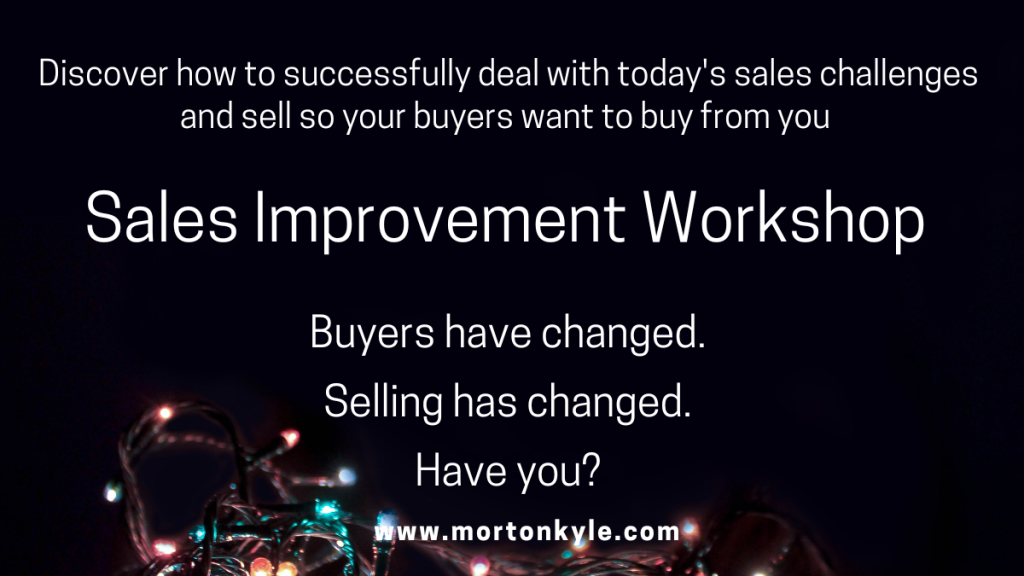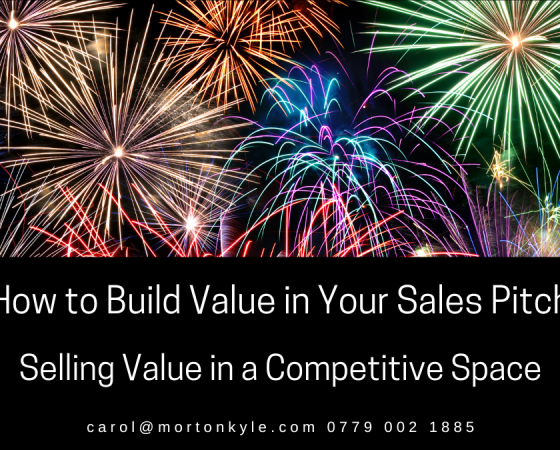How to Build Value – answer that question, specifically for your business, for your buyer, and within the context of your competitive space and the sky really is the limit.
Research is available that claim 57% of the buyer’s decision making is done BEFORE they invite the sales person in…
Whether you believe them or not, the truth is clear…
If you’re trying to get to the decision maker and make an impact then demonstrating value is the game changer.
If you’re in the sales process already, and your competitors are also talking to your buyer, then you have one single aim.
An aim so big, that, if you can reach it will clear the field of the competitors, or at the very least dramatically increase your chances of getting the order
So, what’s the aim?
Your Must Build Value | Value Based Selling
And build that value in such a way that your prospect agrees with you!
Value based selling means you create so much value that:
1. Competitors don’t exist
2. The Buyer would be a fool to walk away from you
3. It reduces the risk involved in buying from you
4. Your Buyer views price as a secondary consideration
(This is the quickest way to increase sales conversion rates AND profits)
You need to understand how to build value in the buyer’s mind so that every time the Buyer thinks about you, your company, your product, your services, anything, the Buyer’s associates high levels of value with your proposal.
That way the Buyer is forced to view you as a serious contender….and discard all others!
Value based selling is your key to unlocking sales opportunities that your competitors can’t touch.
How to Build Such Value
That you become a contender without competition.
Once you know how to build value, you need to know how to communicate that value, how to translate it so that it connects at a DNA level with your Buyer…such that your value’s not a want or a need any more.
You’re value just became a MUST have for this Buyer.
Before we look at how to build value at this level, let’s be super clear what sort of value we’re talking about.
Your Aims in Value Based Selling?
Firstly, what are the aims of the Buyer interaction?
The long term goal is to secure the opportunity to impress the Buyer so that the business can be secured at a price and with terms that are acceptable to you, the provider.
In the short term, the aims maybe to also to:
- Kick the competition into the long grass
- Demonstrate high levels of expertise
- Operate in partner mode and not supplier
- Push the Buyer’s thinking and the boundaries of their understanding in order to seek a better solution
- Advise from a position of strength and experience
- Challenge pre-conceived ideas
- Offer a future proof solution or at least sign post future hurdles and propose solutions or work arounds
- Be open to ideas, highly communicative, transparent, client centric and accessible
- Freely express wisdom, knowledge and insight to the Buyer and his team
- Be the expert in the room with a wealth of information to share
- Share experience and insight
Not much to ask then:
What do we mean by ‘Value’?
To avoid any confusion around what we mean by value based selling, let’s look at what ‘value’ actually means.
Where does your ‘value’ and that of your business come in to the process?
My clients often lack a certain clarity around this area, namely to do with the term ‘value’.
Too often it’s a term that’s misconstrued as ‘giving stuff away’ or as being a major cost with no guarantee of return.
That’s not what we mean here when we talk about value in this context, or in any context really.
Instead, think about value in terms of that special set of factors that only you can bring to the Buyer’s table.
Examples of How to Build Value
Let me give you an example to help you work out what your value is, and how to build value because once you’ve done that, then the aim is to amplify that value for the Buyer, so, here we go…
In order to build value ask yourself:
- What are you/your business REALLY great at?
- In fact, what are your biggest success stories?
- What can you do better than anyone of your competitors?
- Where is your prime expertise?
- What buyer/customer problems have you solved in the past?
- What are the biggest wins you’ve ever made for your clients from solving those buyer problems?
Maybe, think of ‘building value’ in terms of the results that your buyers got from buying from you…
- Allowed your customer to out perform their industry?
- Win a big order?
- Solve a huge problem in their own business?
- Save chunks of time?
- Save oodles of money?
Many firms seek to create value in their supply chain, such functions as Operations, Customer Service, Human Resources, Buying etc.
There is likely a vast supply chain that’s evident within your business that allows what you sell to be delivered to your Buyer; thinking about that supply chain, then ask yoursel;f:
…. what is it that your business does that serves your customer and prospective Buyer at a higher level than any other provider?
How Does Your Supply Chain Build Value for the Buyer?
- It could be that you only recruit people with a specific qualification.
- It could be that you only deal in one specific vertical market.
- You may have a set of quality control procedures that none of your competitors have.
- It could be your delivery policy.
- Your money back guarantee
- Your help-desk and customer service SLA’s
- It could even be your industry accreditation, awards and recognition
Now, at this stage you should have quite a brag sheet there.
It’s a huge list of all the things you’re great at.
Ways you’ve helped clients in the past.
Problem solving and how you’ve solved complex problems, saved money/time.
How Do You Magnify Your Value Proposition for the Buyer?
Now, the simplest way to think about magnifying this value for your Buyer’s and using it to impress upon a prospective Buyer the quality and calibre of your business is to ask one single question against every entry on your list.
The question is this:
What does the Buyer get?
For example, if you only recruit skilled professionals who have a certain level of accreditation….
Perhaps you’ve been in the industry for a certain period of time…
Or have worked to a specific level and standard with critical industry systems.
- Firstly, ask yourself, are these things important to the buyer?
- Secondly, how and why is it important to the buyer?
- Thirdly, what does this mean for the buyer?
It’s that last question where we need to spend the most time.
Where perhaps the answer leads you to
- Sell the benefits associated with having a large and current knowledge bank.
- A highly skilled team, exceptional problem solvers recognised by time served and qualifications.
- Extensive industry experience – seen everything / done everything.
- Able to access their wide network of contacts
- Understand the industry and it’s evolution.
- Already forecasting future trends.
- Have manifestly operated with some of the industries best
- Are apt at constructing workarounds, industry recognised professionals.
You get the picture?
So, what does this mean for the buyer?
S/he’s in safe hands, with a knowledgeable crew, all things are possible, and they’ve trodden this path before…which all means, a lower level of risk for the buyer.
It could also mean a better solution, faster, potentially at a lower rate…it all depends on what you want from the order.
(Having said that high levels of expertise, and a faster, lower risk solution usually indicate a premium solution and that means a premium price)
Value Based Selling | The Next Level Value Question is this
What will the buyer get from buying from you that he will NOT get from buying form any of your competitors?
How To Communicate Value to the Buyer?
After all there is little use in knowing how to build value in your sales pitch and constructing a value based sales proposition if you’re not able to effectively communicate it to your Buyer.
This is just a brief example.
A insight from taking one of the example entries you could have listed on your brag sheet.
But beware – here’s where it can fall down – if your brag sheet is identical to your competitors the you bring no value to the Buyer’s table.
Yes you can still win the business but likely it will be a battle over price and the cheapest provider will win. That’s not a great place to be…
Can every firm and every business display unique value…most can, not all, but most.
Often businesses and sales teams don’t see their value themselves as they are too close.
Often it’s simply a case of extracting the information and building the unique value into the sales presentation – then great things start to happen.
So, back to the example, let’s assume you’ve created lots of valuable insights you can use to support your Buyer and make their decision to pick you very simple…
Now, to really amp up the potency and value, go through and look at the value based benefits for the Buyer for each of the entries on your brag sheet.
Once you’ve done that, pick out the two or three that really make you WILDLY different from any of the competition.
I mean really different.
Not only are these the value elements that will get you through the door, they are also the elements that will get you the order, because they will clear the field of the competition. They are also the elements to help you get the terms you want.
The bigger the gap you can create between you and the rest of the market. The bigger your opportunity to present a more valuable solution for your Buyer. The easier it will be to form a partnership where the Buyer recognises your contribution, values it highly. And is prepared to pay for it.
Plus, the bigger the value you deliver to the Buyer, the great the chance you’ll win the business. And at the price you want.
Learning how to build value. Learn how to deliver that value based message so that your Buyer understands and internalises your contribution and worth. This will shorten sales cycles, increase sales conversion rates as well as boost profits.
Perhaps at this point we can acknowledge that creating value is the wrong term, perhaps it’s about BEING of value.
Of such value that the buyer recognises the folly of moving forward without you on board.
In seeking to be of value, when thinking about how to build value do these three things:
- Play to your strengths, find out what you are GREAT at and play to those skills and experience
- Learn to communicate your value to the buyer so it resonates with them as being authentic, ethical and low risk
- Demonstrate your value before the order is signed
It’s only by being a provider of value can you hope to be of use to the Buyer.
Leaning how to build and communicate value in a way the buyer understands will pay ample short and long term rewards.
How to Build Value…What Next?
For more insights into how to build value in your sales function, sales pitch and your business check out the Sales Improvement Workshop – we spend a day building out your value proposition and making sure it matches with that of your buyer. It’s the single fastest way to solve a lot of sales insues

Value based selling is the fastest way to clear competitors from the field and the easiest way to build concensus with your buyers.
It’s a skill that is transferable to whoever the decision maker is and it’s a tool that’s used at all stages in the sales process.
Join us and build your value based selling skill set today.

Who am I?
I’m Carol Griffiths, and I’ve spent the last 30+ years in the trenches of sales—fixing broken pipelines, rebuilding underperforming teams, and helping businesses close more deals at higher margins.
I’ve worked with global brands, challenger firms, and fast-growth sales teams, helping them:
✔ Fix underperforming pipelines – turning ghosted leads into closed deals.
✔ Increase win rates – without discounting or chasing bad-fit prospects.
✔ Build sales systems that actually work – so you don’t waste time on ‘busy work’ that doesn’t convert.
I’m not another ‘sales trainer.’ I don’t teach theory. I fix sales problems – fast. And if you’re still reading, it means you’ve got a problem that needs fixing.
I know how sales leaders think because I’ve been one. I know what the board wants because I’ve sat in those meetings.
And I know what works – because I’ve done it, tested it, and proved it across industries, markets, and economic downturns.

